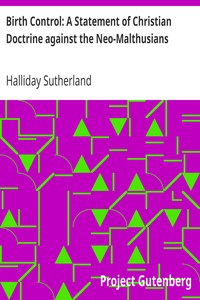| Author |
Sutherland, Halliday, 1882-1960 |
| Title |
Birth Control: A Statement of Christian Doctrine against the Neo-Malthusians
|
| Note |
Reading ease score: 58.0 (10th to 12th grade). Somewhat difficult to read.
|
| Credits |
E-text prepared by Project Gutenberg Distributed Proofreaders
|
| Summary |
"Birth Control: A Statement of Christian Doctrine against the Neo-Malthusians" by Halliday G. Sutherland, M.D. is a critical examination written during the early 20th century, targeting the Malthusian theories surrounding population control and birth regulation. The work argues against the notion that artificial birth control is a remedy for poverty and societal issues, instead asserting that these ideas are based on flawed premises. Sutherland aims to expose the consequences he believes the Malthusian perspective could have on families and societies, particularly from a religious and moral standpoint. The opening of the text outlines Sutherland's objections to the Malthusian theory, particularly the assertion that overpopulation causes poverty and disease. He discusses the ideas of Thomas Malthus, who proposed that population growth inevitably outpaces food supply, leading to societal collapses. Sutherland counters these claims by presenting evidence to suggest that overpopulation does not exist as Malthusians argue and that poverty results from various factors beyond mere numbers of births. He sets the stage for a broader discourse on the moral implications of birth control versus adherence to what he frames as "natural law" and Christian doctrine, suggesting that reliance on artificial means to control population is inherently flawed and detrimental. (This is an automatically generated summary.)
|
| Language |
English |
| LoC Class |
HQ: Social sciences: The family, Marriage, Sex and Gender
|
| Subject |
Birth control
|
| Subject |
Malthusianism
|
| Category |
Text |
| EBook-No. |
8773 |
| Release Date |
Aug 1, 2005 |
| Most Recently Updated |
Jan 2, 2021 |
| Copyright Status |
Public domain in the USA. |
| Downloads |
65 downloads in the last 30 days. |
|
Project Gutenberg eBooks are always free!
|

